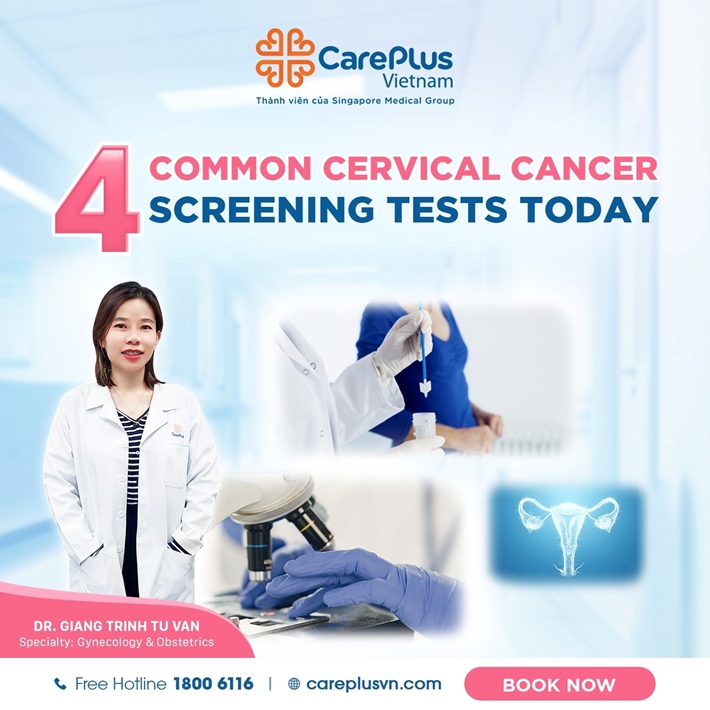LEARN ABOUT 4 COMMON CERVICAL CANCER SCREENING TESTS TODAY
Cervical cancer is a slow-progressing and silent disease, often without symptoms or with symptoms only appearing in the late stages. Therefore, regular screening for cervical cancer plays a crucial role.

5/9/2024 9:46:52 AM
The article was medically consulted by Dr. GIANG TRỊNH TÚ VÂN - Obstetrics and Gynecology Specialist - CarePlus Clinic System.
In fact, all women aged 21 and older, who have had sexual intercourse, should undergo cervical cancer screening. Even if you've only had one sexual encounter or have not had sexual intercourse for a long time, been faithful to one partner, or received the HPV vaccine, you are still at risk of developing the disease. So, do not be complacent and make sure to schedule regular check-ups and screenings. Especially, if you fall under the following categories, you should undergo more frequent screening:
- Have had sexual intercourse or frequently engaged in sexual activity, especially with multiple partners simultaneously.
- Have a weakened immune system due to conditions like HIV infection, organ transplantation, or prolonged steroid use.
- Have had abnormal results from recent cervical cancer screening tests or have a history of HPV infection.
Based on age and medical history, the doctor will choose the appropriate screening frequency and method.
1. PAP SMEAR TEST
This method involves collecting and analyzing cells from the cervix to detect cancer early, before tumors develop. Pap smear tests can also detect abnormalities in the structure and function of cervical cells, indicating early disease risk.
Who should undergo Pap smear testing: According to the American College of Obstetricians and Gynecologists recommendations, Pap smear testing for cervical cancer screening is specifically indicated for different age groups as follows:
- Under 21: No testing required.
- Ages 21-29: Recommended every 3 years.
- Ages 30-65: Negative for HPV, recommended every 3 years, or combined Pap smear and HPV testing every 5 years. Positive for HPV, annual Pap smear and HPV testing recommended.
- Over 65: Testing is not necessary, especially if previous tests within the past 10 years have been negative.
Procedure: Women are instructed to lie on their backs on an examination table with their knees bent. The doctor gently inserts a tool called a speculum into the vagina to widen and stabilize the vaginal walls for a clear view of the cervix. Then, a wooden spatula is used to collect cells from the cervix. These cells are smeared onto one half of a glass slide, spread thinly and unidirectionally to avoid cell damage or clumping. The doctor then rotates the brush along the length of the slide. The second smear is placed on top of the first and sent to the lab for analysis.
Advantages: Low cost, easy to perform.
Disadvantages: Poor cell spreading technique can obscure abnormal cells, as red blood cells, mucus, inflammatory cells, and squamous metaplastic cells may obscure the smear.
2. LIQUID-BASED CYTOLOGY (PATHTEZT MEDITRON – MAX PREP)
This method overcomes most limitations of traditional Pap smears. The sampling principle is like conventional cell smears, using a specialized brush to collect more cells with less cervical trauma. After sampling, the brush is placed in a container with methanol-based preservative. The brush is pushed down, releasing the bristles, and then swirled in the liquid to dislodge the cells.
Principle of operation: centrifugal separation of cervical cells from the liquid, removal of impurities in the sample, and transfer to a glass slide under air pressure for uniform cell deposition. Results are reported according to the Bethesda System.
Advantages: Reduced cells overlap, and quicker analysis compared to conventional smear methods.
3. HPV TESTING (HPV GENOTYPE – HPV COBAS)
Recognizing the essential role of human papillomavirus (HPV) in cervical cancer has led to the development of HPV testing and HPV vaccination. Among HPV types infecting genital mucosa, those associated with cervical cancer and precancerous lesions can be classified into:
-
Low-risk HPV group: includes types 6, 11, 42, 43, and 44.
-
High-risk HPV group: includes types 16, 18, 31, 33, 34, 35, 39, 45, 51, 52, 56, 58, 59, 66, 68, and 70.
-
Sampling principle: like cell smears, using a specialized brush to collect samples from the outer cervix and endocervical canal. After sampling, the brush is placed in a preservative container.
-
Principle: employs target amplification methods. PCR is a nucleotide sequence amplification method, allowing specific DNA segments to be replicated in the test tube to produce multiple copies of a DNA or RNA segment without using living organisms.
-
Advantages: higher sensitivity for detecting precancerous lesions, improved negative predictive value, and safer screening intervals.
4. COTESTING (COTESTING MEDITRON – COTESTING NOVACARE)
This involves conducting PAP smear and HPV tests on the same sample in a single specimen container.
-
Sampling principle: Like liquid-based PAP smear and HPV testing, but only one sample is taken and stored in the same specimen container.
-
Principle: Analyzing two tests on the same sample stored in a specimen container.
-
Results: Reported separately for liquid-based PAP smear and HPV tests as per protocol.
-
Advantages: Lower cost compared to separate testing for each.
NOTE ON CONDITIONS FOR ACCURATE RESULTS:
- Avoid testing during menstruation. The best time is at least 5 days after the end of menstruation.
- Avoid using tampons, vaginal creams, moisturizers, or other vaginal medications or suppositories for 7 days prior.
- Avoid douching for 2-3 days prior.
- Avoid vaginal intercourse for 2 days before the Pap smear test.
Cervical cancer screening is the "golden key" to early detection of risk factors for control and timely treatment. Every woman should proactively undergo screening today to protect herself and her family!